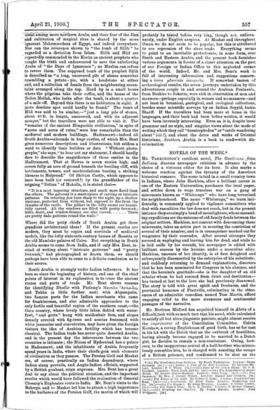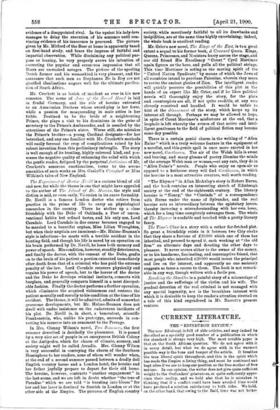NOVELS OF THE WEEK.*
MR. TABKINGTON'S excellent novel, The Gentleman front Indiana, disarms newspaper criticism in advance by the choice of a virtuous editor for its hero. It also marks a welcome reaction against the tyranny of the American historical romance. The scene is laid in a small country town in Indiana, where John Harkless, after a brilliant career in one of the Eastern Universities, purchases the local paper, and settles down to wage traceless war on a gang of miscreants known as "Whitecaps" who have long terrorised the neighbourhood. The name "Whitecaps," we learn inci- dentally, is commonly applied to vigilance committees who deal with rascalities the law does not reach, but in the present instance they are simply a band of moonlighters, whose maraud- ing expeditions are the outcome of old family feuds between the original settlers. Harkless, not content with denouncing these miscreants, takes an active part in securing the conviction of several of their number, and is in consequence marked out for vengeance by their comrades. After several attempts they succeed in waylaying and leaving him for dead, and while be is laid aside by his wounds, his newspaper is edited with brilliant success by the heroine under a masculine alias. Harkless, unaware of her identity, is at first delighted and subsequently disconcerted by the enterprise of his substitute; and suddenly returning to demand explanations, discovers that he has been nominated for Congress in his absence, and that the heroine's gratitude—she is the daughter of an old scholar whom he had rescued from drink and destitution— has turned at last to the love she had previously disavowed. The story is told with great spirit and freshness, and the provincial humours of Plattville, culminating in the utter. ances of an admirable comedian named Tom Martin, afford engaging relief to the more strenuous and sentimental passages of the narrative.
Mr. Bertram Mitford has acquitted himself in Aletta of a difficaltjask with so much tact that his novel, while calculated to satisfy all but ultra-jingoistic patriots, might almost receive the imprimatur of the Conciliation Committee. Colvin Kershaw, a roving Englishman of good birth, has so far cast in his lot with the Dutch that on the outbreak of hostilities, having already become engaged to be married to a Dutch girl, he decides to remain a non-combatant. Owing, how- ever, to the inopportune arrival of a half-brother who miracu- lously resembles him, he is charged with assisting the escape of a British prisoner, and condemned to be shot on the • (1.) The Gentleman from Indiana. By Booth TarkIngton. London : Grant Richards. (6s.]—(2.) Aietta : a Tale of the Boer I neasion. By Bertram Nfit• ford. London : F. V. White. [es.]—(3.) Joan of the. So:on( Hand. By S. It. Crockett. London : Ward, Lock, and Co. [6s.]—(4.) The Experiment of Doctor Nevill. By Emerie Dui:fie-Beaman. London : John Long. (64.1--(6.) Two Summers. By Mrs. J. Glenny Wilson. London : Harper and Brothers. [611.1 —(6.) The Kin is of the East. By Sydney C. Grier. London: Blackwood and Sons. [63.]—(7.) Garlhoiren. By Allen Bathe. London : Machin:mit and Co. [6s.]—(6.) The Rhymer. By Allan McAuley. London : T. Fisher Cnwin. [6s.]—(9.) The Tiger's Claw. By 0. B. Burgin. London : C. Arthur Pearson. [es.]—(10.) Breaking tiie Shackles. By Frank Barrett. London : John v.eQueen. [Gs.]
evidence of a disappointed rival. In the upshot his lady-love manages to delay the execution of his sentence until con- vincing evidence of his innocence is procured. The picture given by Mr. Mitford of the Boer at home is apparently based on first-hand study, and bears the impress of faithful and impartial observation. While disclaiming any political pur- pose or leaning, he very properly avows his intention of correcting the popular and erroneous impression that all Boers are unwashed savages. The picture of the sporting Dutch farmer and his womankind is very pleasant, and the assurance that such men as Stephanns De la Rey are not glorified idealisations augurs well for the ultimate pacifica- tion of South Africa.
Mr. Crockett is as lavish of incident as ever in his new romance. The scene of .1crn qr. the Swr.rd Ilancl is laid in feudal Germany, and the role of heroine entrusted to an Amazonian Duchess whose sword-play is her forte, while a passion for masquerading in male attire is her foible. Destined to be the bride of a neighbouring Prince, she plays a visit to his dominions in the guise of secretary to the Prince's Ambassador, and is assailed by the attentions of the Prince's sister. Worse still, she mistakes the Prince's brother—a young Cardinal designate—for her betrothed, and any one familiar with Mr. Crockett's methods will easily forecast the crop of complications raised by his robust invention from this preliminary imbroglio. The story is well enough of its bustling, highly coloured kind, and pos- sesses the negative quality of enhancing the relief with which the gentle reader, fatigued by the perpetnal_fi)rtino of Mr. Crockett's sonorous emotionalism, turns to the serene amenities of such works as Mrs. Gaskell's Cranford or Miss Wilkins's tales of New England.
The Experiniedt qf D,etor .,1;7•;11 is a curious blend of old and new, for while the theme is one that might have appealed to the author of The 15lancl of Dr. Moreau, the style and diction is mid, or even early, Victorian in its suave formality. Dr. Nevill is a famous London doctor who retires from practice in the prime of life to carry on physiological researches in the country. There be strikes up a close friendship with the Duke of Oaklands, a Peer of uncon- ventional habits but refined tastes, and his only son, Lord Carsdale. Lord Carsdale in due course becomes engaged to be married to a beautiful orphan, Miss Lilian Wronghton, but when their nuptials are imminent—Mr. Hnlme-Beaman's style is infections—he meets with a terrible accident in the hunting field, and though his life is saved by an operation on his brain performed by Dr. .Nevill, he loses both memory and power of speech. His condition, however, steadily deteriorates, and finally the doctor, with the consent of the Duke, grafts on to the brain of his patient a portion extracted immediately after death from that of a criminal who has paid the extreme penalty of the law. Lord Carsdale recovers physically and regains his power of speech, but to the horror of the doctor and the Duke he develops criminal instincts, consorts with burglars, and generally comports himself in a most disreput- able fashion. Finally the doctor performs a further operation, which eliminates the acquired viciousness and restores the patient mentally and morally to his condition at the time of his accident. The theme, it will be admitted, admits of somewhat gruesome developments, but Mr. Hnlme-Beaman does not dwell with undue insistence on the cadaverous incidents of his plot. Dr. Nevill is, in short, a benevolent, scientific Frankenstein, who, unlike his prototype, succeeds in con- verting his monster into an ornament to the Peerage.
In Mrs. Glenny Wilson's novel, Two S 21I/1 ile Pi, the first summer described is decidedly the pleasanter. It is passed by a very nice set of people in an anonymous British Colony at the Antipodes, which for charm of climate, scenery, and society might well be called Arcadia. Mrs. Glenny Wilson
is very successful in conveying the charm of the Southern Hemisphere to her readers, none of whom will wonder when, at the end of a second summer passed between a deadly dull English country house and a London hotel, the heroine and her father joyfully prepare to depart for their old home.
The heroine, however, contracts "another engagement" in the last scene, and we are left in doubt whether "the tree of Paradise" which we are told "is bursting into bloom" for her and her lover is destined to flourish in London or at the ether side of the Empire. The pictures of English country society, while mercilessly faithful to all its drawbacks and insipidities, are at the same time highly entertaining; indeed, the whole book is excellent reading.
Mr. Grier's new novel, The Zing:: of the East, is to a great extent a sequel to his former book, A Crowned Queen. Sings, Queens, Princesses, and Mtnisters hurry across the stage, and our old friend His Excellency " Connt " Cyril Mortimer again figures as the hero, and pulls all the political strings. This time Mortimer is acting as the moving spirit of the
United Nation Syndicate," by means of which the Jews of all countries intend to purchase Palestine, wherein they mean to revive the ancient glories of Zion. The intelligent reader will quickly perceive the possibilities of this plot in the hands of an expert like Mr. Grier, and if he likes political novels will thoroughly enjoy the story, for the plots and counterplots are all, if not quite credible, at any rate cleverly contrived and handled. It would be unfair to hint at the Wnonenunt of the story, which keeps up its interest all through. Perhaps we may be allowed to hope, in spite of Count Mortimer's misfortune at the end, that a loophole is left whereby the return of that active and intel- ligent gentleman to the field of political fiction may become some day possible.
There is a certain genial charm in the writing of "Allen Raine " which is a truly welcome feature in the equipment of a novelist, and this gentle spell is once more exerted in her new novel, Gard/oven. The air of the Welsh hills is sweet and bracing, and many gleams of poetry illumine the minds of the average Welsh man or woman,—at any rate, they do in "Allen Paine's " novels. People who enjoy an open-air as opposed to a hothouse story will find Garthowen, in which the heroine is a most attractive creature, well worth reading.
"The Rhymer" in Allan McAuley's story is Robert Burns, and the book contains an interesting sketch of Edinburgh society at the end of the eighteenth century. The literary heroine is "Nancy," the " Clorinda" of a correspondence with Barns under the name of Sylvander, and the real heroine acts as intermediary, between the epistolary lovers, thereby incurring a misunderstanding with her own lover, which for a long time completely estranges them. The whole of The Rhyner is readable and touched with a pretty literary fancy.
The Tiner'q Claw is a story with a rather far-fetched plot. So great a friendship exists in it between two City clerks that they share a fortune of £20,000 which one of them has inherited, and proceed to spend it, each working at "the old firm" on alternate days and devoting the other days to pleasure. It never occurs either to the owner of the money, or to his handsome, fascinating, and consumptive friend, that most people who inherited 1:20 000 would invest the principal and live on the interest, and apparently no one seriously suggests so tame a. course to them. The book is not remark- able in any way, though written with a facile pen.
Breaking the Shack/es is a painful story of a miscarriage of justice and the sufferings of the victim and his wife. The
gradual detection of the real criminal is not managed with any special ingenuity, nor is the breathless interest with which it is desirable to keep the reader's attention rivetted on a tale of this kind engendered in Mr. Barrett's present venture.



































 Previous page
Previous page